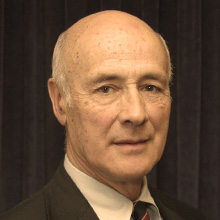Countries that can successfully leverage their national power are able to affect the behavior of other political actors. This can be accomplished through traditional “hard” power measures, such as threats or coercion, or through “soft” power, which enables countries to persuade or attract others to support their interests. A country’s soft power is heavily dependent upon its global image and international prestige. In the case of China, the central government has developed top-down strategies for enhancing China’s soft power, which in conjunction with public diplomacy, are designed to cultivate a positive international image of China.
What do the experts think?

Joseph S. Nye Jr.
University Distinguished Service Professor, Kennedy School of Government, Harvard University

Liz Economy
C.V. Starr Senior Fellow and Director for Asia Studies at the Council on Foreign Relations

David Shambaugh
Professor of Political Science and International Affairs at the George Washington University
Why is China interested in soft power and when did this begin?
Economy: China first began to get interested in soft power in the early 1990s … but I don’t think it really took hold until the mid-2000s, perhaps 2007 when then-President Hu Jintao gave a speech in which he linked the rejuvenation of the Chinese nation to the ability of China to deploy soft power. Watch
Shambaugh: Originally the Chinese thought you just needed basically economic and military power to be a global power, but in the early 2000’s they realized that image matters. Watch
Nye: China believes that it is not going to be a global power . . . unless it has the ability to attract. Unless it has soft power. Watch
Nye: I think probably the most interesting turning point . . . was when Hu Jintao addressed the 17th Congress of the Chinese Communist Party and said that China needs to invest more in its soft power. . . . When you see the big boss say this is a priority then you see a big takeoff in terms of Chinese investments and also in writings about soft power. I think China realizes that it isn’t enough to have economic and military power, it’s more effective if you combine that with soft power. Watch
What is China’s strategy to promote soft power overseas?
Shambaugh: I’d say China has more of a strategy that we would call public diplomacy than soft power, per se. . . . They basically have taken their domestic propaganda template and tried to go global with it. Watch
Nye: [China] has also spent a lot of money on broadcasting and papers … turning Xinhua and CCTV into global media outlets. Watch
Economy: I think that China has a three part strategy. The first is to develop the content of Chinese soft power . . . then there is more traditional ideas of culture: art, music, literature, Chinese traditional medicine . . . Confucianism. . . . The third part of the strategy is developing the vehicle or the mechanisms by which China can project this soft power. Watch
Shambaugh: Soft power . . . is like a country that is a magnet, that attracts others to you, others want to emulate you, they respect you, they value your . . . political system. . . . In other words they want to be like you. . . . That’s soft power. It comes from society. It does not come from the government. Watch
Is this strategy different from its public diplomacy efforts?
Nye: Public diplomacy is one aspect of soft power. You can also get soft power from your policies, if your policies are seen as legitimate and attractive in the eyes of others. Watch
Nye: You can also get soft power from your performance. I think China gets a lot of soft power from its astonishing record economically, raising hundreds of millions of people out of poverty. A lot of people admire that. That produces soft power. Watch
Economy: For most countries, there is a pretty clear divide between soft power and public diplomacy … In China’s that’s different because the government is so concerned to both define and construct the political and the cultural narrative. Watch
Are China’s soft power efforts working, and if so, where are they working?
Shambaugh: I don’t think we can fully pass judgment yet on how successful or unsuccessful China’s soft power, public diplomacy efforts have been, but thus far – not very successful – they have not gotten much return on their investment. Watch
Shambaugh: China’s favorability ratings are mixed at best, and predominantly negative, and declining over time. They have dropped fully 20% from … 2009 to 2015. Watch
Economy: Certainly lifting hundreds of millions of people out of poverty is no small feat … In Africa, Latin America, parts of Southeast Asia, particularly where you have authoritarian regimes, I think that this idea of China as a development model held a certain amount of attraction. I think that may be changing as we now see so many problems emerging with that development model. Watch
Nye: China does better in Africa and Latin America than it does in its own neighborhood in Asia. Watch
Nye: Because China has problems with so many of its neighbors, Japan, India, Vietnam, the Philippines and so forth, that makes it hard to generate a lot of soft power there. Watch
Are China’s Confucius Institutes proving to be successful at promoting Chinese soft power?
Shambaugh: There’s a lot of controversy in American academia and in European academia about these institutes, and whether they are in conflict with values of freedom of inquiry, freedom of teaching, freedom of thought, or are they kind of Trojan horses for Chinese propaganda abroad. Watch
Shambaugh: The content of their courses are purely about language, culture, cooking, film … overall my view is that these [institutes] are fairly benign. Watch
Nye: Confucius Institutes can be a good thing from the Chinese point of view but also from other countries’ point of view – getting a deeper appreciation of Chinese culture … is a good thing. The great problem for China is to make sure that they don’t try to interfere politically with these exchanges. Watch
Economy: There are now upwards of 400 Confucius Institutes globally and I think the greatest success that they’ve had certainly has been simply in the promulgation of the teaching of the Chinese language … beyond that the Confucius Institutes vary greatly in terms of what they bring to the table. Watch
Economy: The Confucius Institutes can only be as powerful, as influential as … China will allow them to be. Watch


